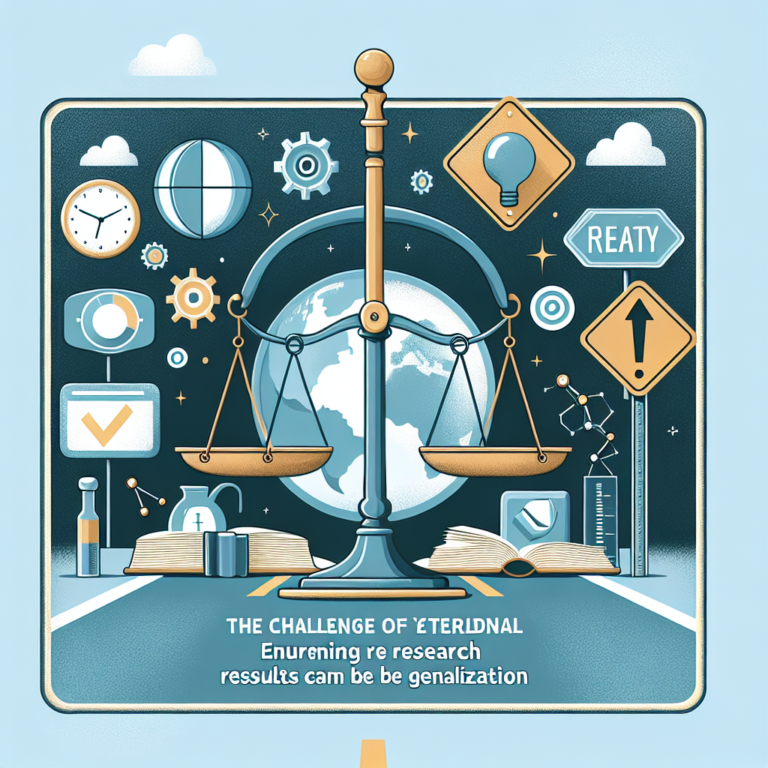
Introduction
In the vast landscape of scientific inquiry, one concept shines as a beacon of reliability: the control group. Understanding the control group: the cornerstone of experimental research isn’t just a catchphrase—it’s a fundamental principle that provides the backbone for credible results across various fields, from psychology to medicine, and social sciences to marketing. This article dives deep into why control groups matter, how they function, and the real-world implications of their use, keeping you informed and engaged throughout this exploration.
The Importance of Control Groups in Experimental Research
When embarking on any experimental study, the stakes are high. Researchers must be meticulous in distinguishing the effects of the variable under investigation from other extraneous influences. Here, understanding the control group becomes crucial.
What Is a Control Group?
A control group is a baseline that provides a point of comparison for evaluating the effects of an experimental treatment. By keeping all conditions similar except for the variable being studied, researchers can isolate the impact of that variable.
Example of a Control Group
Consider a clinical trial aimed at testing a new medication. The experimental group receives the medication, while the control group receives a placebo. This setup allows researchers to understand the drug’s efficacy without the influence of external factors.
Case Studies Illustrating the Importance of Control Groups
1. Medical Trials: The Landmark Study of the Polio Vaccine
In the 1950s, Dr. Jonas Salk conducted the first systematic trial of the polio vaccine. The trial included 650,000 children, with half receiving the vaccine and half serving as a control group. The outcome? A significant reduction in polio cases among vaccinated children can be confidently linked to the efficacy of the vaccine.
Relevance: This case exemplifies how critical a control group is in determining the effectiveness of medical interventions.
2. Psychology: The Stanford Prison Experiment
The infamous Stanford Prison Experiment conducted by Philip Zimbardo in 1971 sought to understand the psychological effects of perceived power. While it lacked traditional control groups, the study’s design has led researchers to call for stronger controls in future experiments to mitigate ethical concerns and bias.
Relevance: This example highlights the necessity of control groups in preventing bias and ensuring the reliability of psychological experimental results.
3. Marketing Research: The A/B Testing Phenomenon
In the world of digital marketing, companies often perform A/B tests to compare two versions of a webpage. Group A might see the original design, while group B gets the new design. By measuring the variations in user engagement or conversion rates, marketers can confidently attribute changes to the design.
Relevance: This illustrates practical applications of control groups in commercial settings, showcasing their universal importance.
How Control Groups Work: A Deep Dive
To fully grasp "understanding the control group: the cornerstone of experimental research," we must explore how they function operationally.
Types of Control Groups
Placebo Control Groups
- Often used in medical research, where a substance with no active therapeutic effect is administered to assess the true efficacy of an experimental treatment.
Active Control Groups
- These groups receive an existing treatment to compare the new intervention against the standard of care.
- Historical Control Groups
- Previous studies serve as a comparative baseline, although less rigorous due to variability over time.
Designing an Effective Control Group
Random Assignment
One of the most critical aspects of a reliable control group is random assignment. By ensuring participants are randomly allocated, researchers can minimize selection bias and distribute confounding variables evenly between groups.
Blinding Techniques
Blinding—where participants or researchers are unaware of group assignments—maximizes objective assessments and reduces the risk of biased results.
The Ethical Considerations of Control Groups
Ethics play a significant role in establishing control groups, particularly in fields like medicine. Researchers must balance the need for valid results with the moral obligation to prioritize participant welfare.
Informed Consent
Participants must be fully informed about their involvement, especially when control groups might involve placebos that withhold potentially beneficial treatments.
Ethical Oversight
Institutional Review Boards (IRBs) often scrutinize experiments to ensure ethical standards are maintained, particularly in studies involving vulnerable populations.
Challenges in Using Control Groups
While control groups are essential, utilizing them isn’t without challenges.
Variability and Confounding Variables
The presence of extraneous variables can complicate interpretations. This is why maintaining strict conditions is vital.
Sample Size Limitations
Limitations, such as budget constraints or limited availability of participants, can affect the power and generalizability of control group findings.
Visualizing Effectiveness: Tables and Charts
To clarify the effectiveness of control groups, visualizations can deliver impactful insights. Below is an example of how results can be presented.
| Study Type | Treatment Group Size | Control Group Size | Outcome (%) | Improvement from Control (%) |
|---|---|---|---|---|
| Polio Vaccine Trial | 325,000 | 325,000 | 0.1 | 70% |
| A/B Testing (Website) | 5000 | 5000 | 5% | 25% |
Conclusion
Understanding the control group: the cornerstone of experimental research is pivotal for ensuring the credibility and accuracy of scientific findings. Whether in a medical trial or marketing strategy, control groups provide the context needed to interpret results meaningfully and ethically.
As you navigate through different research studies and potentially implement your experimental design, always prioritize the establishment of a solid control group. Not only will this enhance the validity of your findings, but it will also contribute significantly to the body of knowledge across various fields.
FAQs About Control Groups
1. What is the main purpose of a control group in an experiment?
The primary function of a control group is to establish a baseline against which the effects of the experimental treatment can be compared.
2. Why is random assignment important in control groups?
Random assignment minimizes selection bias, ensuring that any differences observed are attributable to the treatment rather than pre-existing differences among participants.
3. Can a study have multiple control groups?
Yes, researchers can utilize multiple control groups to compare different treatments or interventions, increasing the depth of their findings.
4. How does blinding work in a control group?
In blinding, either the participants or the researchers (or both) are kept unaware of group allocations to minimize bias in treatment administration and outcome evaluation.
5. What ethical considerations surround control groups in medical research?
Ethical considerations include informed consent, the necessity of a placebo, and ongoing monitoring to ensure participant safety.
In summary, recognizing the significance of control groups enhances not only the integrity of individual studies but also the overall reliability of scientific discourse. As you integrate these insights into your research or practice, may you inspire others through your commitment to scientific rigor and ethical standards.

















